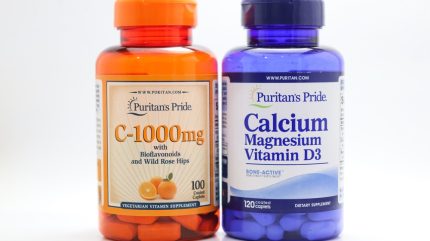
Four years after Nestlé spent more than $5bn to acquire a clutch of vitamins and supplements brands, some of the assets look set for disposal.
Nestlé said today (24 July) that it is launching a “strategic review of our mainstream and value brands” within the vitamins, minerals and supplements (VMS) business.

Discover B2B Marketing That Performs
Combine business intelligence and editorial excellence to reach engaged professionals across 36 leading media platforms.
The Swiss giant said the assets up for review include Nature’s Bounty, Osteo Bi-Flex and Puritan’s Pride, along with the private-label VMS business in the US.
In 2021, the company forked out $5.75bn to purchase those brands, and the own-label operations in the US, from The Bountiful Company. The deal struck with private-equity firm KKR also included Solgar.
Solgar is among the “premium” vitamins, minerals and supplements brands that Nestlé said today will shape its focus, along with Garden of Life and Pure Encapsulations.
Nestlé made no mention on the future of the eight manufacturing facilities in the US that it acquired from Bountiful as part of the KKR transaction.

US Tariffs are shifting - will you react or anticipate?
Don’t let policy changes catch you off guard. Stay proactive with real-time data and expert analysis.
By GlobalDataBountiful was originally founded as Nature’s Bounty before it was rebranded in 2017. The acquired assets sit within Nestlé’s Health Science portfolio, which also houses the Atrium Innovations VMS assets bought in 2017 for $2.3bn.
“Our VMS business will focus on global premium brands, such as Garden of Life, Solgar and Pure Encapsulations where our capabilities in science, innovation and brand-building give us a distinct competitive edge,” Nestlé explained in its results announcement for the first half of fiscal 2025.
Reported sales for Nestlé Health Science dipped 0.4% to SFr3.2bn ($4bn) over the first six months of the year, although organic revenue was up 3.4%. Real internal growth (RIG), which strips out the effect from pricing on the organic numbers, was 3.3% with pricing of 0.1%.
“In VMS, growth was impacted by the discontinuation of some private-label business and weaker performance in our mainstream brands, particularly Puritan’s Pride,” Nestlé said.
It added that “sales momentum in premium brands, particularly Pure Encapsulations and Solgar, was partially offset by declines in mainstream and value brands”, along with the loss of the own-label business.
Barclays’ analysts led by Warren Ackerman wrote today that a “strategic review of mainstream VMS will be welcomed”, estimating sales of the assets up for potential disposal at around SFr1bn.
China weakness
Nestlé reiterated today the “heightened risks” it flagged at the first-quarter results announcement in April around “continuing macroeconomic and consumer uncertainties”.
Those uncertainties are also evident in China, where Nestlé said today it is “taking steps to strengthen [its] growth profile”.
Nestlé explained in the results commentary: “In Greater China, we are taking material steps to strengthen performance, including changes in leadership.
“In recent years, we have grown the business by expanding distribution. This model has become challenged by a weaker consumer and the deflationary environment. To deliver sustainable growth, we are now focusing on driving consumer demand by strengthening our value proposition. It will take up to a year to return to sustainable growth.”
Financial guidance for 2025 was left unchanged, “despite factoring in increased headwinds”, the KitKat maker said. Nestlé said China weighed on the group’s second-quarter organic growth performance by 70 basis points and impacted RIG to the tune of 40 basis points.
Organic sales are still forecast to “improve” compared to 2024’s 2.2% print, “strengthening over the year as we continue to deliver on our growth plans”.
The outlook for the underlying trading operating profit margin (UTOP) remains “at or above” 16%.
“We are executing our strategy to accelerate performance and transform for the future,” CEO Laurent Freixe said.
“We are accelerating our category growth and improving our market share through better execution and increased investment, funded through a relentless pursuit of efficiency. These actions are already delivering results, with broad-based growth and a robust profit performance in the first half.”
For the group, reported sales fell 1.8% to SFr44.23bn in the first half. Organic growth was 2.9%, accelerating from 2.1% in the same period of 2024. RIG was 0.2%, up from 0.1%.
Pricing was 2.7% compared to 2% a year earlier as Nestlé said it “took actions to address input-cost inflation in coffee and cocoa-related categories”. While confectionery and coffee were the largest organic growth contributors, pricing was 10.6% and 6%, respectively.
The UTOP margin dropped to 16.5% from 17.4%. Net profit was also down, falling 10.3% to SFr5.07bn. Underlying earnings per share dropped 5.4% to SFr2.27.
Nestlé’s shares were down 4.9% at SFr73.93 as of 11:15am BST in the UK today. They are down 0.9% so far this year.





